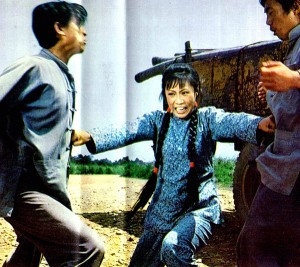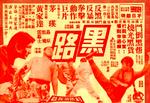The Opium Trail
黑路
Hong Kong, 1973, colour, 2.35:1, 94 mins.
Director: Huang Feng 黄枫.
Rating: 4/10.
Blocky drama of drug smuggling is a sub-par work by all concerned, with clumsily staged action.
A border town, northeast China, the early 1930s. Opium smuggler Han Fei (Yun Il-bong), who represents a Japanese organisation, requests the collaboration of local gangster Wu Si  (Nan Rongxun) in the safe passage of a large shipment through his town. Also looking for Wu Si is Bai Jian (Huang Jiada), a martial artist out to avenge his brother’s murder. After a run-in with the corrupt local police, Bai Jian is sheltered by restaurateur Qin (Ge Xiangting) and his daughter Qin Suhua (Mao Ying). Han Fei hears from his colleague Hong Xibo that a rival, Zhai (Yi Yun), is planning to steal the opium shipment. Hong Xibo kills some of Zhai’s men but is himself killed by Qin Suhua, who is actually an undercover anti-drugs agent. Tensions escalate as the lorries carrying the opium get nearer to the town, with Bai Jian taking on Wu Si in an inconclusive fight.
(Nan Rongxun) in the safe passage of a large shipment through his town. Also looking for Wu Si is Bai Jian (Huang Jiada), a martial artist out to avenge his brother’s murder. After a run-in with the corrupt local police, Bai Jian is sheltered by restaurateur Qin (Ge Xiangting) and his daughter Qin Suhua (Mao Ying). Han Fei hears from his colleague Hong Xibo that a rival, Zhai (Yi Yun), is planning to steal the opium shipment. Hong Xibo kills some of Zhai’s men but is himself killed by Qin Suhua, who is actually an undercover anti-drugs agent. Tensions escalate as the lorries carrying the opium get nearer to the town, with Bai Jian taking on Wu Si in an inconclusive fight.
REVIEW
An independent production by a company started [in 1973] by former Shaw Brothers executive Ricky Uy, The Opium Trail 黑路 in fact boasts an impressive technical and cast line-up drawn from Golden Harvest personnel. [The company, Panasia Films 泛亚影业, was subsequently bought by Golden Harvest in 1976.] All the more pity, then, that the result rarely measures up to its inherent potential, despite the fact that there are many incidental pleasures along the way. The customarily measured style of [director] Huang Feng 黄枫 here becomes almost block-like in structure: long, relaxed scenes of dialogue (government agents and various criminal types all after a consignment of opium in a small frontier town) separated by self-contained combat sequences which are almost casual in their staging. The ritual of Hap Ki Do 合气道 (1972) and the furious fights of When Tae Kwon Do Strikes 跆拳震九州 (1973) are both absent; Huang’s evocation of small-town life (cicadas chirruping at night, overhead shots of wind-blown streets, pan-pipes on the soundtrack) evokes the classic Hollywood B-Westerns or the early Sergio Leone/Clint Eastwood films. At the same time Huang pokes gentle fun at the two genres: Huang Jiada 黄家达 [Carter Huang] wanders through the film as a “man with a mission”, tracking his victim (Hu) with all the rock-like qualities of a Randolph Scott; elsewhere, the diminutive (five-foot-three) size of Mao Ying 茅瑛 [Angela Mao] is parodied in a David-and-Goliath fight with a heavy, she being hurled through the air like a football, he transfixing himself on the behind on a six-inch nail. Mao’s absence from the action, as in Hap Ki Do, is again used as a dramatic device; its success, however, depends on her scattered appearances being correspondingly dynamic, and in The Opium Trail the combat sequences are both clumsily staged and limited in repertoire. Her dress (mottled blue again) and capacity for filial piety become almost self-parodistic, in the same way as the portentous patriotic speech at the end linking opium trafficking with Japan’s plan to ruin and enslave China. A hasty work, then, from all concerned – and far from justifying its censor’s certificate. [Like all Chinese martial arts films of the time, the film got the top adult rating of “X” – no admission for anyone under 16 – from the British Board of Film Censors.]
CREDITS
Produced by Panasia Films (HK).
Script: He Ren. Photography: Li Youtang. Editing: Jiang Xinglong. Music: Gu Jiahui [Joseph Koo]. Art direction: Cao Mianlong. Action: Chen Quan.
Cast: Mao Ying [Angela Mao] (Qin Suhua), Huang Jiada [Carter Huang] (Bai Jian), Yun Il-bong (Han Fei), Nan Rongxun (Hu Si/Scarface), Ge Xiangting (Qin), Yi Yuan (Zhai), Li Hong.
Release: Hong Kong, 21 Jun 1973.
(Review section originally published in UK monthly films and filming, Aug 1975, as Deadly China Doll. Modern annotations in square brackets.)
